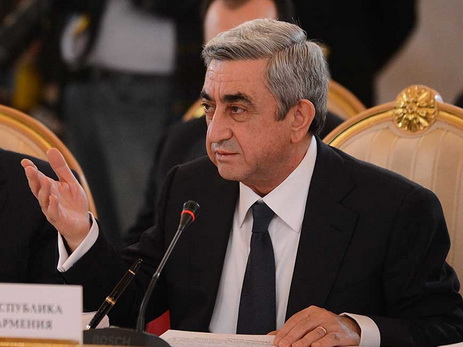Parliamentary elections in Armenia and its impact on Nagorno-Karabakh conflict

By Najiba Mustafayeva
The Parliamentary elections in Armenia will be held on 2 April 2017. Following constitutional amendments, endorsed by voters in a referendum in December 2015, Armenia is transitioning from a semi-presidential to a parliamentary political system.
The changes considerably reduce the powers of the president in favour of the prime minister and the parliament. For the first time, voters will elect members of parliament (MPs) under the revised political system.
Notable the elections will be held one year before the start of the second and last parliamentary term of Serzh Sarkisian and the end of Armenia’s transition to a parliamentary system. The National Assembly which will be elected in April will also choose the next president of Armenia, which will obtain a formal honorary role.
In anticipation of this event Armenia attempted to freeze the negotiation process on Armenian-Azerbaijani conflict over Nagorno-Karabakh, aimed at maintaining the status quo in affront to international law and relevant UN Security Council resolutions.
However, the ramifications of the armed clashes between Armenian and Azerbaijani military forces along the LoC at the beginning of April 2016 demonstrated that the status quo has been already changed. Due to the successful counter-attack of the Azerbaijani armed forces in response to the provocation of Armenia armed forces, some strategic heights that had been under the occupation were retaken for the first time since a ceasefire agreement in 1994.
The four day war brought renewed dynamism to international mediation efforts, underlining the necessity of genuine conflict resolution efforts in order to prevent the resumption of full-scale war. The Presidents of Azerbaijan and Armenia met in Vienna and Saint Petersburg, and the ceasefire has largely been adhered on the line of contact.
Aftermath Armenia attempted to utilize its traditional provocative policy of recognition of the so-called “Nagorno-Karabakh Republic”, aimed at spoiling the negotiation process.
International organizations and world states adhere to the position that Nagorno-Karabakh belongs to Azerbaijan, and the military forces of Armenia must be withdrawn from all occupied territories of Azerbaijan, which finds its legal consolidation in the documents adopted by international organizations on the Nagorno-Karabakh conflict, first and foremost, in the resolutions of the UN Security Council.
Moreover, on June 16, 2015, Grand Chamber of the European Court of Human Rights has delivered its judgment in Chiragov and others v. Armenia, declared that violation of the applicants` rights occurred on the sovereign territory of the Republic of Azerbaijan. However, responsibility for those violations falls upon on the Republic of Armenia which occupied part of the Azerbaijani territory. Therefore, for the European Court to find violation of the applicants` rights it was necessary, at the outset, to prove that Armenia exercises effective control over occupied territories. The judgment of the Court indicates that Armenia exercises effective control not only over the district of Lachin, but also Nagorno Karabakh and seven surrounding districts. The Court also established that the Republic of Armenia pursues policy of ethnic cleansing against Azerbaijanis, and held that the Republic of Armenia is responsible for that situation persists to this day. With reference to the 1907 Hague Convention on respecting the laws and customs of war on land and 1949 Geneva Convention relative to the protection of civilian persons in time of war, the Court noted that notion of effective control in fact denotes belligerent occupation. Thus, Armenia`s occupation of the Azerbaijani territories has been proved in the Court`s judgment, which has binding legal force and no international organisation or any state may deny it.
As Foreign Minister of Azerbaijan, Mr. Elmar Mammadyarov recently remarked, unconditional and complete withdrawal of the Armenian armed forces from the Nagorno-Karabakh region and other occupied territories of Azerbaijan is a demand of international community and in no way can be introduced as a compromise or used as a bargaining chip to link withdrawal of troops to addressing the political issues.














